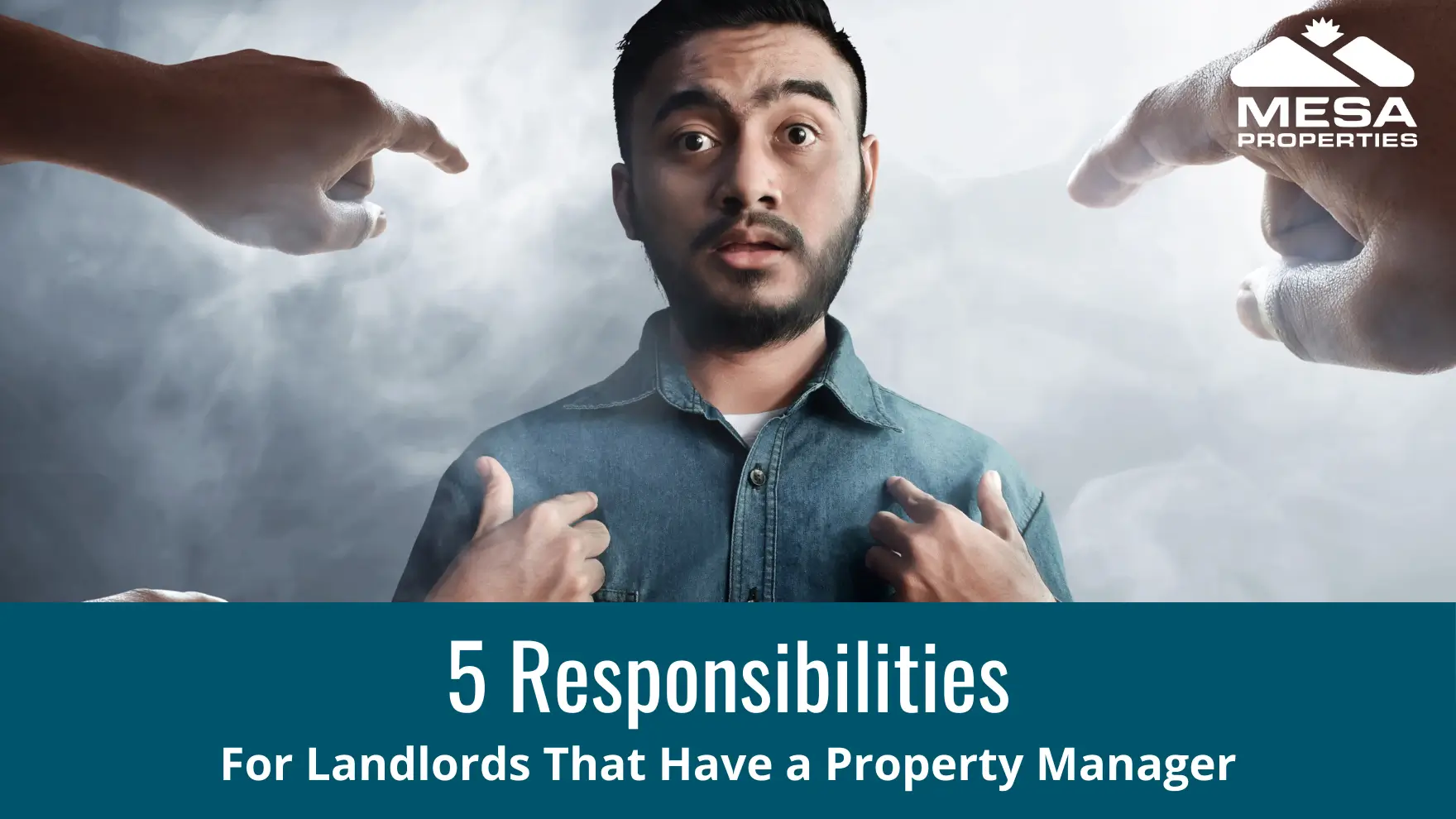Hiring a property management company to deal with your rental can feel like a major weight has lifted from your shoulders. No longer are you the one who has to take those tenant phone calls, deal with maintenance issues, show your vacant property or be the point of contact. This was the best financial decision you've made in a long time.
This feeling of freedom is wonderful and one of the main reasons many landlords hire a property manager to begin with. They just don't want to deal with that pesky rental anymore!
If you are a landlord that has hired a property management company, you may be wondering what you are still responsible for. While the property management company can take most of the headache out of owning your rental, they aren't the owner or the principal and are limited in the decisions they can make.
So what are you still responsible for? Here are 5 things that landlords still need to keep in mind, even after hiring a property management company.
1. Have A Maintenance Reserve
If you own rental property, be it 1 home or 100, you own a business and that business shouldn't be one unexpected expense away from failing.
In other words, don't run your rental "paycheck (rent check) to paycheck."
Most property management companies have their own maintenance reserve so they can have funds for minor repairs or bills that come up. This reserve can range from $200 to $500 depending on the company.
However, a couple hundred bucks isn't going to be enough to cover a major expense like a new water heater or an air conditioning system.
If the time comes for a major expense and you don't have the funds necessary to make the repair, your tenant isn't going to care that you failed to plan. One of the reasons they may be renting is because they don't want to have to deal with major expenses like this. You don't want to lose a good, performing tenant because you're unable to make the necessary repairs in a timely manner. That will hurt you financially much more in the long run.
A good rule of thumb is to have 1-2% of your rental property's value budgeted for repairs, or three times the gross rent. Not only will that cover most major expenses, it will also help cover your mortgage payment in the event your tenant moves out and the property is vacant and isn't generating rent income for a few weeks.
2. Have A Communication Plan
Just like having a maintenance reserve, many property managers will have an authorized spend limit that they can authorize repairs up to before contacting you for approval. Most repairs are unexpected and will sometimes exceed that pre-authorized limit.
You don't need to be available 24/7 like you would if you were responsible for dealing with your tenant directly, but you do need to have a communication plan in place so your property manager can reach you quickly for authorization on more expensive repairs.
If you're going on vacation or will be unreachable by email for a while, it's a good idea to have someone that your property manager can contact for approval in the event an emergency comes up. Most property managers have a clause in their agreement that allows them to authorize repairs over the spend limit if it's a habitability issue, but they prefer to be able to contact you first so there's no surprises on that next monthly statement and cash flow.
3. Return Security Deposits Promptly
There are a couple of different ways property managers handle security deposits. Some hold them in their own trust account so they can return them when the tenant moves out and some transfer them to the owner to hold.
If your company transfers them to you, it is very, very important not to treat that deposit like a bonus or like it's money that you earned. When your tenant moves out, you have a legal responsibility (and a timed one at that) to return the correct portion of that security deposit to them.
If you've hired a property management company, then it will likely be their job to return the deposit assuming they placed the tenant, so your only responsibility here is to return it to them as soon as your tenant gives notice so they can prepare to return the correct portion to the tenant.
4. Turn Utilities On And Off Around Vacancies
Some property managers can handle utility turn ons and offs for you but some can't. Many cities won't allow anyone but the owner or tenant to turn utilities on or off, but even if they did, most management companies aren't willing to take on the liability of having multiple vacant property utilities on in their name at any given time.
If your management company informs you that utilities will be your responsibility, it's best to have them turned on as soon as a property goes vacant and off the day your tenant moves in.
When your tenant moves out and turns the utilities off and you don't turn them back on immediately, you can greatly slow the process of getting your home re-rented. Your property manager will need electricity to be able to properly conduct a move out inspection and water to test all fixtures and check for leaks. Cleaners and contractors will also need power and water to be able to clean or perform repairs as necessary. Having utilities on right away after a vacancy means everyone can get to work ASAP and you can go back to doing anything than managing your property!
5. Have Reasonable Expectations of Your Tenant
I mean this specifically as it pertains to maintenance requests.
One reasonable expectation you should have of your tenant is that they pay rent on time, in full, every single month. No questions asked and no hassle.
One reasonable expectation your tenant should have of you is that maintenance issues are handled in a timely manner.
What this doesn't mean is that you should balk every time your tenant submits a service request and try to discourage them from continuing to do that. Certainly, there are unreasonable requests like modifications to the property or fixing something that the tenant themselves has damaged without expecting them to pay for it, but many tenant requests are reasonable and in your best interest to perform.
If your tenant is simply notifying you about an issue with the property that is legitimate, you should be thankful, not upset. Tenants that submit service requests for legitimate issues are doing one of the two things that makes them a good tenant, taking care of the property (with the other thing being paying rent in full and on time).
You may think it's wonderful to have a tenant that you never hear from and from whom the rent comes in like clockwork every month, until they move out and you realize how much deferred maintenance there is on your property.
Tenants have an obligation in their lease to inform you of actual issues, especially ones that threaten the condition of the property like water leaks, roof leaks, security issues and other habitability issues, so don't be upset with them when they do exactly that.
Besides, a good property manager will be able to help you filter through what's a legitimate request, what isn't necessary and what's tenant caused damage. If your property manager is getting your approval for a repair, it's probably because they have used their experience to determine that it's a valid request.
Summing It Up
Hiring a property manager means you can relinquish the day to day responsibilities of owning and managing rental property (and the stress that goes with it!), but it doesn't mean you can go completely dark and hands off.
If you do one thing and one thing only, just be communicative and responsive with your property manager. They won't need to contact you often at all so when they do, it's probably pretty important!
All of these responsibilities, if taken seriously, can help maximize the profitability of your rental property and minimize your stress - a win-win situation.



